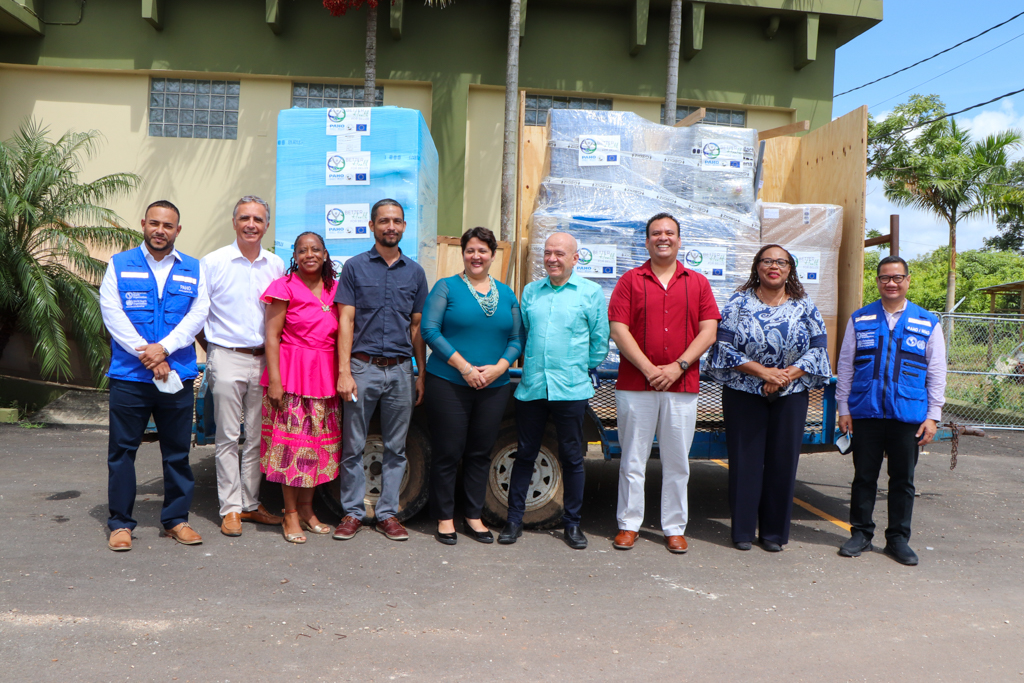In July 2020, the European Union (EU) reallocated 500,000 Euros from the existing “Health Sector Support Programme Project (HSSP),” to be put towards the preparation and response to COVID-19. Through this reallocation, the EU and the Pan American Health Organization/World Health Organization (PAHO/WHO) donated two medical waste autoclaves (valued at over BZD$400,000) to the Ministry of Health and Wellness (MoHW). This action is linked to the Health Sector Programme for Belize financed by the EU with more than 10 million USD implemented by its partner PAHO/WHO.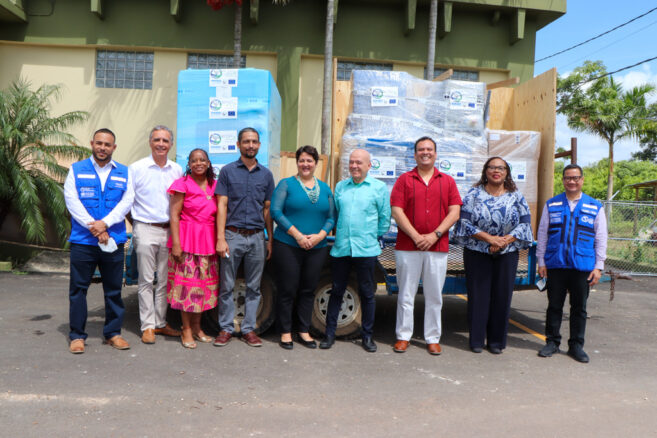 Globally, the COVID-19 pandemic has put a strain on and challenged the overall health system in unprecedented ways. Healthcare waste management was one of the major strains that arose due to the response to the pandemic. Thus, the need for health facilities throughout the country to strengthen and safely manage infectious waste became a priority, especially during these times of COVID-19.
Globally, the COVID-19 pandemic has put a strain on and challenged the overall health system in unprecedented ways. Healthcare waste management was one of the major strains that arose due to the response to the pandemic. Thus, the need for health facilities throughout the country to strengthen and safely manage infectious waste became a priority, especially during these times of COVID-19.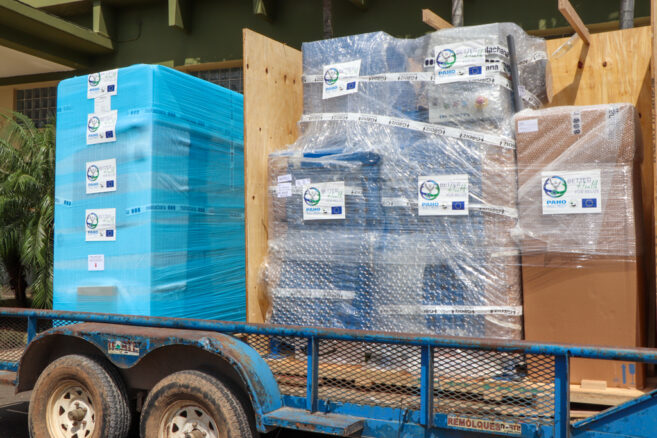
“We had to work with the Ministry of Sustainable Development, Climate Change & Disaster Risk Management and the environmental units,” said Dr. Noreen Jack, PAHO/WHO Representative in Belize. “Working collaboratively in an intersectoral way, we were able to come up with the specifications to enable the purchase of what would be the best for the particular situation.”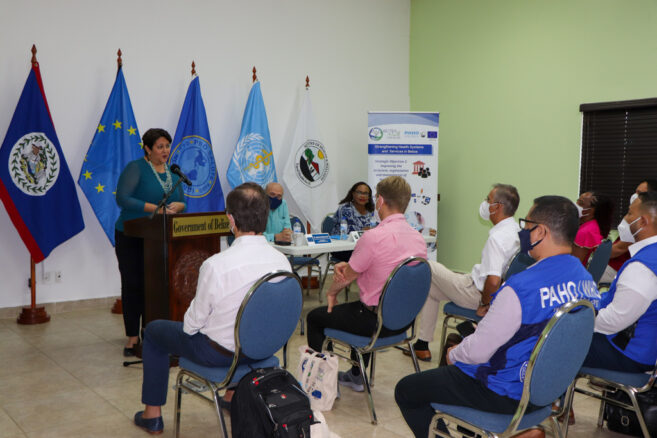
In the healthcare setting, sterilization is crucial to prevent the spread of infections and diseases such as COVID-19 both inside and outside the facilities. As one of the most effective forms of sterilization that is more environment-friendly, the donated autoclaves will play an essential role in proper waste management, primarily being used to sterilize infectious waste before they are disposed of in designated landfills.
Apart from preventing the spread of infectious diseases that can endanger the well-being of both the staff and patients, autoclaving also adds another layer of prevention and protection when it comes to environmental health by combating pollution and mitigating climate change. Unlike incinerators, autoclaves use less energy and reduce the number of harmful emissions such as carbon that is emitted into the air.
“In Belize, the European Union has been working together with PAHO, for almost 20 years to provide more efficient and higher quality health care for the people of Belize,” said Aniceto Rodriguez Ruiz, Head of Cooperation. “Through the donation of the autoclaves, the Ministry of Health and Wellness will enhance the hospital’s capacity for infection prevention and control with a focus on medical waste management.”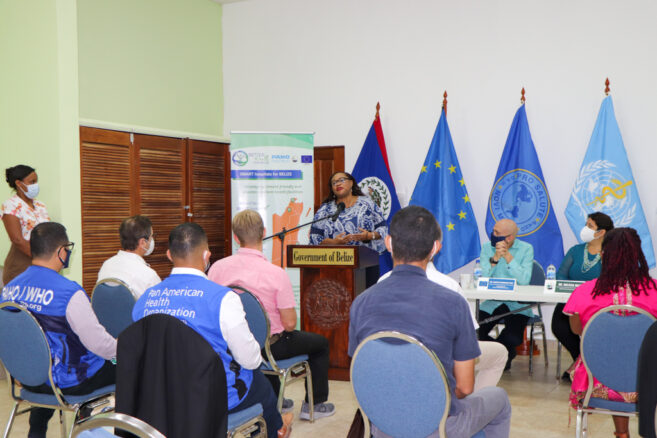
Corozal Community Hospital and Punta Gorda Community Hospital, which are the recipients of the autoclaves, can therefore take the necessary steps in the proper disposal of waste to safeguard both human and environmental health in their facilities and communities. Health personnel will also receive training in preventative maintenance and care of the autoclaves.
“Today marks a very important milestone for the Ministry of Health & Wellness in addressing hazardous hospital waste within our health facilities,” said Dr. Melissa Diaz, Director of Public Health & Wellness of the MoHW. “The handing over of these autoclaves will no doubt enhance the proper disposal of hospital waste without harming our natural environment. On behalf of the Minister of Health & Wellness, I express sincere gratitude to all involved in making this activity a reality.”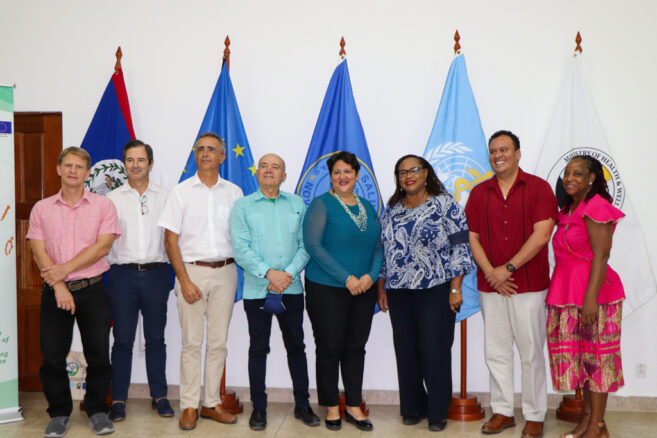
Despite the challenges the COVID-19 pandemic has posed to the health system, it has identified opportunities to strengthen different areas of health including ways to enhance Infection, Prevention, and Control (IPC) by reducing and safely managing medical waste. PAHO/WHO Belize and the European Union continue its support to the health needs and challenges of the country.
Moreover, the EU’s reallocation of funds supported the enhancement of the national laboratory network diagnostic capacity through the purchasing of test kits, equipment, and supplies as well as provided training on their use. The funds also improved integrated healthcare at the community level by providing health promotion and community engagement materials as well as donating personal protective equipment (PPEs) and other supplies.
About PAHO/WHO
The Pan American Health Organization/World Health Organization (PAHO/WHO) works with the countries of the Americas to improve the health and quality of life of its population. Founded in 1902, it is the world’s oldest international public health agency. It serves as the Regional Office of WHO for the Americas and is the specialized health agency of the Inter-American system. For further information please contact Zenena Moguel, Communications Consultant at [email protected] and/or Rick Rhaburn, Media & Communications at [email protected], or visit paho.org/en/belize.

